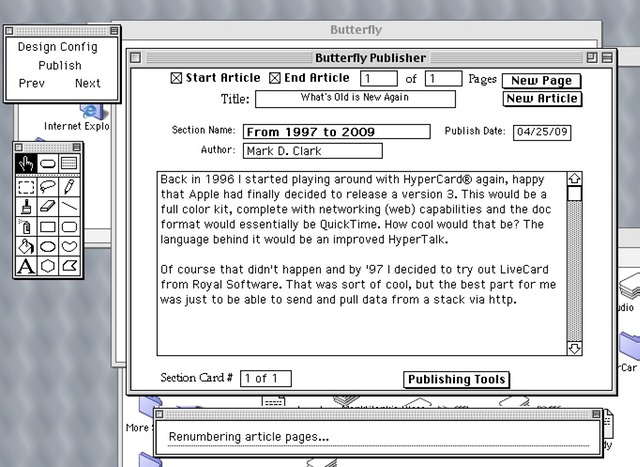Original Landing
[This is the original landing page and is outdated. xtalk in runrev is now renamed as livecode and you can indeed write iphone apps. The web browser plug-in never really caught on, and with html5 and ajax probably isn't needed anyway.]
The majority of programs are one off miracle cures. They are hopefully small, probably ugly, and very useful at the moment. Then they go into the recycle bin. Or trash, or the black hole if you go back that far.
Some of those utilities or prototypes get the designation of "interim solution." Most of the interim solutions I've built have never been replaced.
Revolution is a great tool for building prototypes. Because the keepers of the keys are building a web plugin I think there's a chance that we'll see a resurgence of sharing of these one hit wonders not seen since HyperCard. Unless they screw up the security model.
The plugin will be a sort of network enabled Home Stack, and most of the stacks will be less than twenty lines of code. If you ever programmed in (g)awk you'll appreciate that brevity. Not that xtalk is anything like awk, except useful in the right hands.
Because xtalk is easy to get started with some people get sucked in before they realize that they've gone from a simple command structure (go here, do that, etc.) to private functions, multi-dimensional arrays and something that was supposed to be simple "scripting" but sort of looks like programming after all. Maybe that will encourage some people who never considered programming to do just that.
This isn't a tool to build iPhone apps. It's a tool that makes it possible for normal people to easily start crafting programs to do things the way they want to do them. I think that's in the spirit of the creators of HyperCard and HyperTalk.
History
Years ago I asked a friend of mine who worked in the academic computing department to help me choose a computer for a new non-profit I was putting together. This was 1989 and the PCs on campus were relatively primitive. I did most of my work on the campus VAX-11 series minicomputer and the operator had given me some decent space and permission to use BITNET. But what I really wanted was a chance to run my own computer.
Albert showed me the new SE/30 he had just purchased. The screen was B&W and small but when combined with Aldus Pagemaker it was a natural to help me put together stunning (at the time) presentations and brochures.
But what really amazed me was a program called HyperCard...
Here's a link to a 1987 Computer Chronicles report on version 1.0
In 1996 I started playing around with HyperCard again, happy that Apple had finally decided to release a version 3. This was supposed to be a full color kit, complete with networking (at least http) capabilities and the doc format would essentially be QuickTime. The language behind it would be an improved HyperTalk. Of course that didn't happen and by '97 I decided to try out LiveCard from Royal Software. The best part for me was just to be able to send and pull data from a stack via http.
At the time I thought it was too difficult to quickly jot down new thoughts, messages, etc. for posting on the web. Plus, a lot of sites didn't make use of a simple page for showing what was new since my last visit, etc. So I figured maybe a portion of a site could contain a simple set of directories for articles, indexed with a simple mechanism to show "what's new." Then again I thought it would be handy to make it easy to subscribe to certain web sites and organize them into a collection that even a child could easily manage. And so I thought I could create a "Butterfly Browser," one that grabbed specialized content from web sites, but didn't break the html standards (so any browser would do), but gave people like me who sort of missed the old "Home Stack" a way to organize one more layer (networked) of stacks to play with.
Those buttons would be iconic or custom images from the various authors, arranged on a card or a stack of cards. The stack would be the "Butterfly Collection," so to speak. Once I faced up to the fact that Apple was not going to revive HyperCard I decided it was past time to move on. It was a fun ride, and building toys and even a few serious automation systems was a snap using HyperTalk, but it was over. One thing this experience gave me was a clue as to how terrible it is to see your language die. Of course a better version of the xtalk variant was in the making, but I was busy doing other things, like everybody else.
